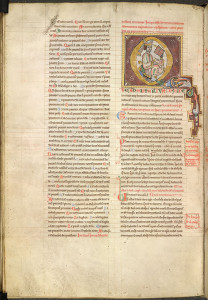“Kalamazoo,” as the annual International Congress on Medieval Studies (ICMS) is often affectionately known, has a reputation for exuberance and even eccentricity. Dorm room living, cafeteria meals, blacksmiths and medieval instrument makers alongside university presses in the exhibit hall, sessions organized by Benedictine monks, among other unusual features, all make for a very interesting annual gathering of nearly 3,000 medieval studies scholars of all descriptions.
In spite (or perhaps because) of these unusual features, this year’s 49th ICMS (hosted, as always, by the Medieval Institute at Western Michigan University) felt like a very modern conference. Medieval studies is a highly interdisciplinary field that includes, among others, history, art history, architecture, literary criticism and languages, as well as theology and religion. Many of the panels reflect this diversity and demonstrate a level of interaction between the disciplines that is often absent among scholars who study time periods where the wealth of sources engenders greater specialization. The sessions—of which there were almost 500—included everything from very traditional medieval studies scholarship to a range of digital topics. I attended a training session in the library on how to use MESA—the Medieval Electronic Scholarly Alliance—a project that provides tools for discovery and access to a huge range of medieval resources, and allows users to create collections and exhibits that can be saved for future use and shared with colleagues, students, and collaborators. Another session, “Medieval Manuscripts in the Digital Age,” looked at a several projects that are using digital tools to virtually reconstruct medieval codices.
A notable feature of this year’s conference that created a buzz was the Medieval Women Wikipedia Write-In organized by Dorothy Kim, an English professor at Vassar College, and the Society for Medieval Feminist Scholarship. Held throughout the conference, the organizers provided training in editing Wikipedia entries and encouraged scholars to get involved in improving the quality of entries, a topic that is also the subject of a recent piece by Stephen W. Campbell in Perspectives on History.
I was invited to participate in a panel on open access and the digital publication of dissertations organized by the Graduate Committee of the Medieval Academy of America. The event included people from libraries at the Universities of Pennsylvania and Michigan and an editor from the University of Toronto Press. In spite of being at 8:30 on Sunday morning (after the dance that is one of the social highlights of Kalamazoo) the session was well attended. The panelists spoke broadly about how digital publishing and dissertation deposit is changing the landscape and the impact this is having. This fostered a lively discussion of the issues faced by graduate students and recently minted PhDs as they navigate the complex world of digital deposit and scholarly publishing. For early career historians this is an issue that continues to cause concern.
With everything from medieval numismatics to digital technology driven scholarship on offer, the ICMS is an exciting event. I look forward to future trips to Michigan to further experience the full range of medieval studies that Kalamazoo has to offer.
This post first appeared on AHA Today.
Tags: AHA Today Digital History Global History
Comment
Please read our commenting and letters policy before submitting.






